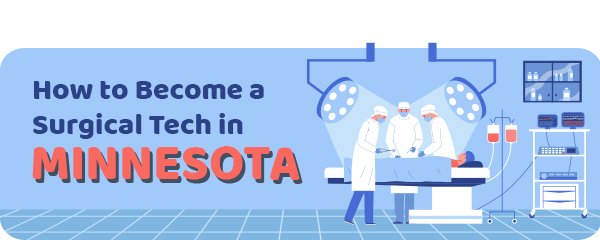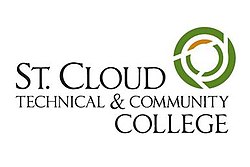
Minnesota is home to a dedicated team of healthcare professionals operating within surgical settings, contributing significantly to the success of surgical procedures.
The surgical team comprises various specialists, including surgeons, anesthesia experts, surgical nurses, and surgical technicians.
The last ones may be known by different titles, such as operation room (OR) techs and scrub techs.
Their collaboration extends from the pre-operation preparations to post-surgery care.
Article Table of Contents
Surgical Technologist Job Description and Duties
A surgical technologist is responsible for a range of duties during their work shifts, which include:
- Preparing patients for surgery
- Transporting patients to and from the OR
- Preparing the OR with surgical equipment and supplies
- Monitoring the instrument count throughout surgery
- Handing the surgeon medical instruments
- Closing wounds and bandaging patients
It’s essential to understand that these duties do not cover the entire scope of responsibilities that a surgical technologist may undertake.
Surgical Technologist Training and Education in Minnesota
Individuals pursuing a career as surgical technologists in Minnesota commence their journey by graduating from high school or obtaining a GED.
Their next step is to enroll in a training program tailored to this occupation.
While there is no specific institutional jurisdiction, students should seek comprehensive education and clinical training.
Several institutions across Minnesota offer such training with varying enrollment requirements but common course content:
- Microbiology,
- Pathophysiology,
- Pharmacology,
- Anatomy,
- Physiology,
- Medical terminology.
- CPR and/or BLS and/or AED
Prominent institutions in Minnesota that provide surgical technology training include:
Bevill State Community College 
This institution offers a surgical technology program that covers topics such as sterile processing, infection control, sterilization, instrumentation identification, and safety.
Admission prerequisites may include:
- Holding a high school diploma or GED,
- Passing the Accuplacer placement exam,
- Having prior medical-related experience.
Completion of a minimum of 120 clinical cases is required, with at least 30 cases in General Surgery, including 20 in the first scrub role.
Calhoun Community College 
This program spans around two years or four semesters and includes classroom, lab, and clinical instruction.
Students aiming for an AAS degree must complete an additional 18 credits in general education coursework.
To gain admission, prospective students are required to:
- Complete an online application
- Attend a program information session, successfully pass a Manual Dexterity Exam,
- Meet the college’s specific admission criteria.
St. Cloud Technical and Community College 
To be accepted, you’ll have to maintain your current healthcare provider and have certification for CPR/AED.
At this college, students can choose between:
- A 49-credit diploma program
- A 60-credit associate degree program in surgical technology.
The second program is an AAS and some of the topics studied are:
- Medical Terminology
- Interpersonal Communication
- Human Anatomy/Physiology
- Ethics
Program graduates are prepared to pass the CST exam.
Minnesota West Community and Technical College
There are several locations for students to choose from and to complete Minnesota West’s two-year AAS degree program in surgical technology.
The total number of credits at the end of the program is 60.
This state’s law requires students to undergo background study.
Rochester Community and Technical College 
This is also an AAS degree program, Rochester students take 60 credits of coursework, including general studies and surgical tech coursework.
Students also participate in hands-on work experience in clinical settings, including the Mayo Clinic hospitals.
A maximum of 20 students are accepted every year in the surgery technology program.
This means competition is high and candidates must obtain at least a “C” in all prerequired courses.
To pass into the second year, students must pass all the subjects from the first year.
| School Name | Address |
|---|---|
| Bevill State Community College | online |
| St. Cloud Technical and Community College | 1540 Northway Dr, St. Cloud, MN 56303 |
| Minnesota West Community and Technical College | 1450 College Way, Worthington, MN 56187 |
| Calhoun Community College | online |
| Rochester Community and Technical College | 851 30th Ave SE, Rochester, MN 55904 |
Becoming a Certified Surgical Technologist in Minnesota
While certification is not legally mandated, many employers in Minnesota prefer certified surgical technologists.
Various certifying bodies offer recognition in this field, such as:
- The National Surgical Assistant Association (NSAA)
- The National Board of Surgical Technology and Surgical Assisting (NBSTSA)
- The National Center for Competency Training (NCCT)
The NBSTSA certification, with national recognition, is the most reputable among these.
The certification exam consists of 200 questions, with a passing threshold of 119 correct answers.
The exam fee varies based on membership status.
Certification renewal, required every four years, can be achieved through either:
- Retaking the exam, along with the exam and renewal fees
- Completing continuing education requirements, along with a renewal fee.
Surgical Technologist Salary in Minnesota
Surgical technologists play a crucial role in the healthcare system, and this is reflected in their salaries.
In Minnesota, the average annual income for an operating room technician is around $52,700.
Some cities in Minnesota offer the potential for higher salaries compared to other regions.
Annual Salary Range:| Location | Avg. Annual Salary |
|---|---|
| Minnetonka | $54,800 |
| Wayzata | $54,700 |
| Willernie | $54,600 |
| Lakeville | $54,500 |
| Afton | $54,400 |
| Stillwater | $54,400 |
| Wyoming | $54,300 |
| Stacy | $54,300 |
| Vermillion | $54,200 |
| Watertown | $53,200 |
Regional Salary in Minnesota
| Region | Employed | Avg. Annual Salary | Avg. Hourly Pay | Top 10% Annual Salary | Bottom 10% Annual Salary |
|---|---|---|---|---|---|
| Duluth, MN-WI | 140 | $62,330 | $29.97 | $74,600 | $51,230 |
| Mankato-North Mankato, MN | 40 | $64,450 | $30.99 | $72,630 | $60,680 |
| Minneapolis-St. Paul-Bloomington, MN-WI | 1,150 | $68,790 | $33.07 | $81,000 | $62,200 |
| Rochester, MN | 240 | $64,180 | $30.86 | $84,410 | $40,390 |
| St. Cloud, MN | 80 | $59,310 | $28.51 | $65,500 | $49,800 |
* Employment conditions in your area may vary.
Frequently Asked Questions
Can a Surgical Tech From Minnesota Choose a Specialty?
YES!
Just like surgeons can choose to operate on a specific body part, so can these techs.
Here are the most commonly chosen surgery niches:
- General surgery,
- Ob/gyn,
- Urology,
- Plastics,
- Neurology
Where Do Surgical Technologists from Minnesota Find Work?
These technologists usually work in a hospital’s surgery wing.
Furthermore, these other places also hire such specialists:
- Children’s hospitals
- Cosmetic surgery centers
- Specialty clinics for surgical procedures
What Sills Do I Need To Work As A Surgical Tech in Minnesota?
Here are the most important skills this profession requires:
- Able to work as part of a team
- Detail-oriented
- Take direction
- Understanding medical terms
- Understanding medical methodology
- Good communication skills
Read the full guide: How to Become a Surgical Technologist